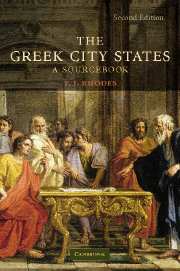Book contents
- Frontmatter
- Contents
- List of Maps
- Preface to the First Edition
- Preface to the Second Edition
- Map 1 The Greek World
- Map 2 Attica
- Introduction
- 1 The Homeric State
- 2 The Archaic State
- 3 Economic and Political Development; Tyranny and After
- 4 Sparta
- 5 Athens
- 6 Women and Children
- 7 Economic Life
- 8 Religion
- 9 Other Cities
- 10 Beyond the Single City
- 11 The Hellenistic and Roman Periods
- Bibliography
- Index of Texts
- Index of Names and Subjects
2 - The Archaic State
Published online by Cambridge University Press: 05 June 2012
- Frontmatter
- Contents
- List of Maps
- Preface to the First Edition
- Preface to the Second Edition
- Map 1 The Greek World
- Map 2 Attica
- Introduction
- 1 The Homeric State
- 2 The Archaic State
- 3 Economic and Political Development; Tyranny and After
- 4 Sparta
- 5 Athens
- 6 Women and Children
- 7 Economic Life
- 8 Religion
- 9 Other Cities
- 10 Beyond the Single City
- 11 The Hellenistic and Roman Periods
- Bibliography
- Index of Texts
- Index of Names and Subjects
Summary
The world in which Homer lived, in the late eighth century, was probably not strikingly different politically from the world represented in the Iliad and the Odyssey. The Greeks – in mainland Greece, the islands of the southern Aegean and the west coast of Asia Minor – lived in some hundreds of poleis, ‘city states’, each of which comprised a village with some farm land around it, usually separated by hills from neighbouring states. Within the state the clearest line was that between nobles and commoners: kings were not so clearly set apart from the other nobles, and by the end of the eighth century most states had at their heads not hereditary kings but officials appointed from the nobility (sometimes basileus, ‘king’, survived as the title of one of these officials): there was a council of nobles to advise the king or chief officials; and an assembly of adult male citizens could be summoned, but probably it did not meet often and its ordinary members were not expected to play an active part in the proceedings (Homer had perhaps witnessed the humiliation of a Thersites).
KINGS AND ARISTOCRATS
The replacement of kingdoms by aristocracies
Classical Greeks were unaware of the dark age, the period after the fall of the Mycenaean kingdoms in which the population of Greece declined and the level of civilisation dropped.
- Type
- Chapter
- Information
- The Greek City StatesA Source Book, pp. 22 - 30Publisher: Cambridge University PressPrint publication year: 2007



